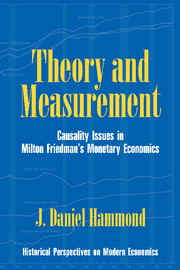Book contents
- Frontmatter
- Contents
- Acknowledgments
- Introduction
- 1 Theory and Measurement at the National Bureau
- 2 Origins of Friedman's Marshallian Methodology
- 3 Origins of the Monetary Project
- 4 Critiques from Within the National Bureau
- 5 Post Hoc Ergo Propter Hoc: Part I
- 6 Reactions to the Monetary History
- 7 Post Hoc Ergo Propter Hoc: Part II
- 8 Friedman and His Critics on the Theoretical Framework
- 9 The Great Depression
- 10 Measurement without Measurement: Hendry and Ericsson's Critique
- Conclusion
- Appendix
- Bibliography
- Index
8 - Friedman and His Critics on the Theoretical Framework
Published online by Cambridge University Press: 16 September 2009
- Frontmatter
- Contents
- Acknowledgments
- Introduction
- 1 Theory and Measurement at the National Bureau
- 2 Origins of Friedman's Marshallian Methodology
- 3 Origins of the Monetary Project
- 4 Critiques from Within the National Bureau
- 5 Post Hoc Ergo Propter Hoc: Part I
- 6 Reactions to the Monetary History
- 7 Post Hoc Ergo Propter Hoc: Part II
- 8 Friedman and His Critics on the Theoretical Framework
- 9 The Great Depression
- 10 Measurement without Measurement: Hendry and Ericsson's Critique
- Conclusion
- Appendix
- Bibliography
- Index
Summary
Introduction
This chapter considers what has come to be known as the debate over Friedman's monetary framework, which took place initially in a September/October 1972 JPE symposium and continued in a 1974 Brown University symposium. The debate was the culmination of the theoretical criticism of Friedman and Schwartz's work on money and business cycles.
By the late 1960s they had published several major works from their National Bureau research project; Friedman had published a number of critiques of Keynesian analysis and of Keynesian inspired large-scale econometric models; he had challenged the efficacy of fiscal policy, which was a cornerstone of Keynesian “New Economics” in Washington; and he had sent forth a number of Chicago-trained monetary economists into leading academic institutions. There was a distinctive Chicago school of thought on money and monetary policy. Indeed, Friedman's interest and skill at communicating his views to the general public through forums such as his Newsweek column and debates such as with President Kennedy's chairman of the Council of Economic Advisors, Walter Heller, made the Chicago school famous outside as well as within academia. But within the community of economists, doubts remained about the theoretical underpinnings of the Chicago doctrine.
Because the prevailing orthodoxy in macroeconomics was Keynesianism, and therefore most of Friedman's critics identified themselves as Keynesians, Friedman and his critics alike tended to set the distinctive ideas emanating from Chicago in opposition to Keynesianism.
- Type
- Chapter
- Information
- Theory and MeasurementCausality Issues in Milton Friedman's Monetary Economics, pp. 140 - 165Publisher: Cambridge University PressPrint publication year: 1996



